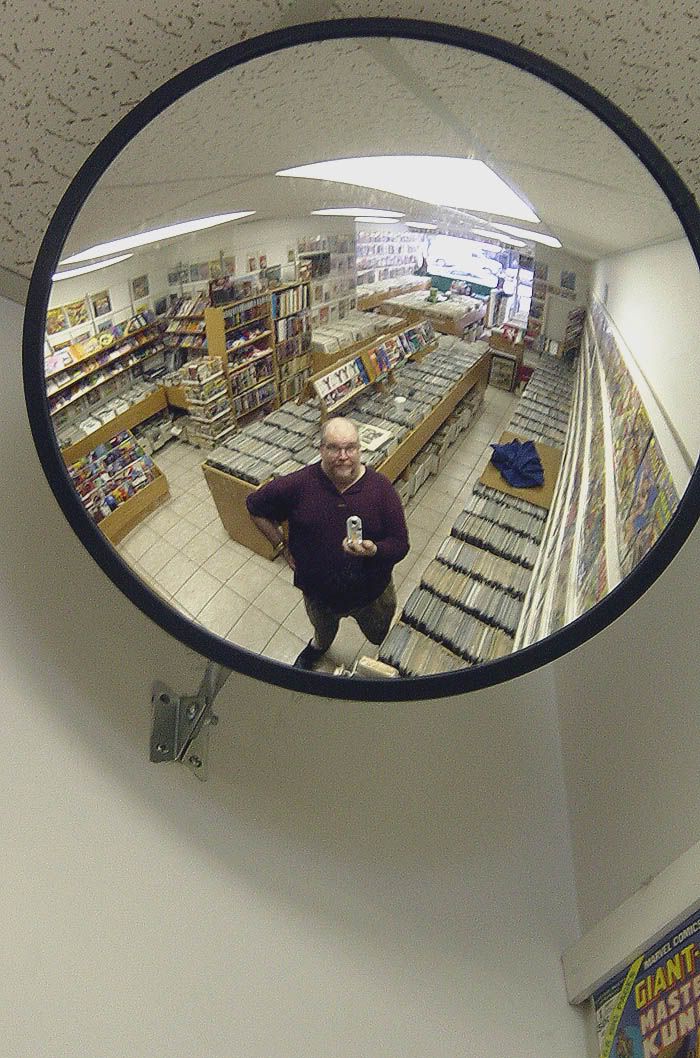
There's a reason there are mirrors high up in the corners of markets, and it's not necessarily what you think it is. They are there because they prevent crime.
No, it's not that they provide an angle that allows the store clerk to see a crime take place, and its not that they are one-way mirrors. When a potential thief sees himself in the mirror, he is more likely not to steal. He sees himself from a third person perspective, and the person he is seeing is the bad guy.
In one social psychology experiment, an experimenter put 150 candies on a table with a sign that said "Take one candy."
After an allotted period of time, and recording how many kids approached the candy bowl while hiding inside the house, the experimenter took the candy bowl and counted how many were taken. He then refilled the bowl with 150 candies but this time he put a mirror behind the bowl. After the allotted amount of time, he took the bowl and counted the candies again.
This experiment has been done repeatedly by psychology students all over the world, and every time the result is roughly the same. With the mirror there, children will usually take only one candy, and without the mirror, they will take more.
To answer the question, "What is God?" I'm going to say it is something of an internal mirror. Freud called it the Superego, Plato called it a Form, Christians call it YHWH, Muslims call it Allah. It is the ideal self, that perfect man or woman we would like to be, and sometimes we even actively strive to be like it.
While we were growing up, we pick up on various social norms like 'stealing is bad' and internalize it into our proper behavior. The social pressure that stems from this becomes our foundation for morality.

There is another force at work here that determines our behavior. Freud called it the Id, Plato might have called it 'natural urges', Christians call it the Devil, Muslims call it Shai'tan. I'll call it the Animal self. Having evolved from animals, we have much of the same basic urges that they do. We have the need for air, food, water, space, and sex. And if we don't get the right amount of these things, we suffer.
And so it is, that we are in a constant tug-of-war between these two things; our higher Ideal Self which proscribes what morality is, and the Animal Self which dictates our physical needs and desires.
Unfortunately, in the material realm, the realm of practicality, it is nearly impossible to be like the Ideal Self, and it is socially reprehensible to be like the Animal Self. Both are essential to our being, and so we find some kind of balance between the two extremes. The balance of the two, the actuality of what we are, has been called many things, but I will call it the Actual Self.
I would like to reiterate that there is nothing new that I'm proposing here. This has been noted many times throughout history and by people of conflicting beliefs. What might be different to you is applying these things to the question of what God is. There is a kind of universal experience that we all share just by virtue of living, thinking, remembering, and interpreting.
Collectively, this amounts to a certain expectation that is put on the individual, and this expectation is reinforced through parenting, by the school system, by our religions, philosophies, culture, and history.
God is the mirror that reflects the sum of all these mental constructions back at the self. God doesn't exist outside of our minds, He exists as a result of them. God is the mental reflection of all the things we think are Good; and His antithesis, call it the Devil, call it the Id, or call it the Animal Self, is the thing we don't want to accept as a part of our selves.
And so we demonize it. We don't want to see it in ourselves.
My suggestion is that we don't have to embrace the Animal Self, nor should we reject it. Rather, we should just understand the Animal Self and accept it. It is an inalienable part of who we are.


No comments:
Post a Comment